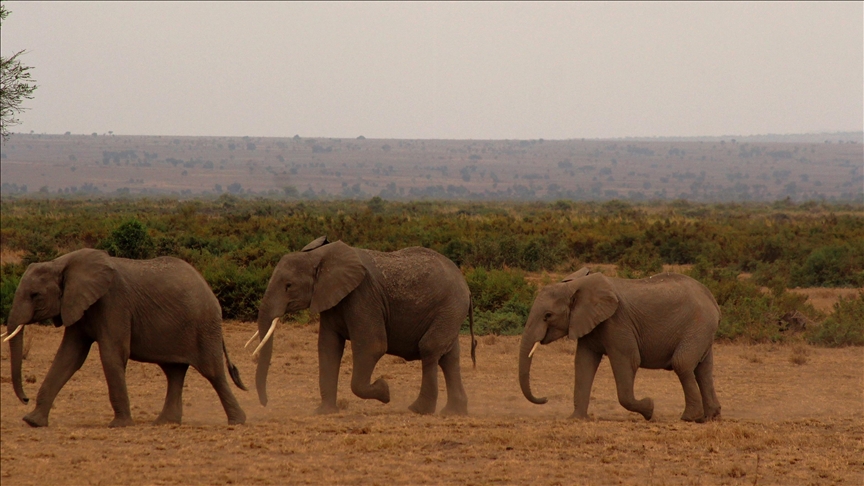Kenyans adopt, name elephants in conservation drive
Twin calves Scotty, Scot among named Tuskers
 Photos: Andrew Wasike - Anadolu Agency
Photos: Andrew Wasike - Anadolu Agency
NAIROBI, Kenya
Kenya, which has been experiencing a boom in baby elephants, received a boost Saturday to its conservation efforts of the majestic Tuskers after it officially launched a naming ceremony.
Kenyans gathered at Amboseli National Park for the adoption and naming of the Tuskers. Kenya Wildlife Service and the tourism ministry allowed the general public to adopt and name select elephants after donating to the initiative, which is aimed at boosting conservation efforts of the endangered species.
“We have just adopted two giant Tuskers. We have adopted them to ensure that we can conserve these beautiful animals and we can ensure that future generations can enjoy what we are seeing today -- herds upon herds of elephants,” Ann Joy Michira told Anadolu Agency after adopting two Tuskers for 1 million Kenya shillings ($10,000).
Tourism Board CEO Betty Radier said the funds will go a long way to the conservation of the majestic animals.
“It is going to be an ongoing program that allows not only Kenyans but people who are not in our industry from the private sector, international guests, friends to just come together to save the elephants,” she said, “As Kenya tourism board we are open and ready for travel so magical Kenya waits for you and the magic awaits you.”
Tourism Minister Najib Balala also lauded the initiative as a move toward the inclusion of the public in conservation as well as providing enough resources for the protection of elephants in Kenya.
Congratulating those who had adopted and named elephants, Balala said, “This is certainly a great milestone for Kenya. This initiative will go a long way in ensuring that elephants are protected in Kenya not only for ourselves but also for the future generations."
Balala said that Amboseli National Park, which lies on the foothills of Mount Kilimanjaro, has more than 1,800 elephants with over 200 calves born since the onset of the coronavirus -- the highest number recorded in decades.
Kenya Wildlife Service Director Gen. Brig. John Waweru (retired) said there is an urgent need to conserve Kenya’s wildlife, “especially the species classified as endangered or threatened. While it is important to note that we have made huge progress in this, the continued loss of ecosystem and rising human-elephant conflicts continue to derail our efforts in this regard.”
Among the named elephants were twin calves big tuskers Scotty and Scot and other baby elephants born between 2020 and 2021.
Kenya is home to 36,280 elephants, representing a 12% growth from 2014, when poaching was at its peak, according to the Kenya Wildlife Census Report.
The Ministry of Tourism and Wildlife announced it mobilized 16.5 million shillings ($150,150) from the conservation drive.
Anadolu Agency website contains only a portion of the news stories offered to subscribers in the AA News Broadcasting System (HAS), and in summarized form. Please contact us for subscription options.



